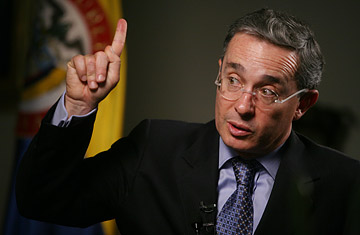
Colombia's President Alvaro Uribe speaks during an interview.
Colombians have become accustomed to seeing their prickly President, Alvaro Uribe, lose his cool whenever he feels he or his family is under attack. But his onslaught last week on the country's highest courts, as well as some of its most respected journalists, surprised even Colombia's most hardened of political observers.
Recently, Uribe, one of the Bush Administration's closest allies in Latin America, has had to deal with scandal investigations surrounding his government and lingering questions about his political past. And he has been lashing back harshly and, some critics say, indiscriminately. Last week, he issued a dryly worded communique effectively accusing an investigating judge of the supreme court of plotting to implicate the President in a failed murder attempt. Uribe said he had received a letter from a mid-level paramilitary leader known as "Tasmania" saying magistrate Ivan Velazquez had offered legal benefits to the jailed militia leader if he testified that the President had ordered a failed 2003 hit on another paramilitary member known as Rene.
Uribe said he confronted Velasquez with the information in a phone call in which the judge denied he had ever mentioned the President in his meeting with Tasmania. Nonetheless Uribe felt the need to publicly demand an investigation by the prosecutor's office into the paramilitary's allegations. The Supreme Court backed its investigator and accused Uribe of obstructing justice.
Over the past several years Uribe and the Supreme Court have clashed repeatedly. The court, and in particular Velazquez, has spearheaded investigations into a widening scandal linking paramilitary leaders with dozens of politicians, most of whom are Uribe supporters. On Oct 4 the court announced it was investigating Uribe's cousin Sen. Mario Uribe in connection with the scandal. "Against all odds, Colombia's Supreme Court has been making unprecedented progress in investigating links between paramilitaries and politicians close to the President," said Jose Miguel Vivanco, Americas director at the Washington-based Human Rights Watch. "President Uribe's phone calls to the judge charged with these highly sensitive investigations amount to political pressure that could intimidate the court and affect the outcome of the cases."
A week before the flap with the court, Uribe launched a tirade against Gonzalo Guillen, correspondent for the Miami-based El Nuevo Herald, sister paper to the Miami Herald. Uribe said in radio interviews that the reporter had "dedicated his journalistic career to infamy and lies" aimed at discrediting the President. Guillen says he received 24 separate threats on his life after Uribe's comments and left the country days later.
Specifically, Uribe accused Guillen of being the ghost writer of a tell-all book by Virginia Vallejo, once the lover of legendary drug lord Pablo Escobar. Guillen denies having anything to do with the book. In Loving Pablo, Hating Escobar, Vallejo calls Uribe's father one of Colombia's "first drug traffickers". The President's father was killed in 1983 by Marxist rebels in a botched kidnapping attempt. According to Vallejo, Escobar offered Uribe his helicopter to transport his father and brother, who was injured in the attack, from their farm to Medellin. News reports from the time, describing the failed kidnapping corroborate her account. Bad weather prevented Escobar's helicopter from landing and Uribe's father and brother were transported by land, according to the newspaper El Mundo."Every time such allegations are revived, Uribe loses his temper and demonizes whoever is investigating," wrote Daniel Coronell, director of the Noticias Uno newscast in a recent column for Semana magazine. Coronell recently returned to Colombia after escaping numerous death threats after airing a report that alleged that a helicopter belonging to Uribe's father was found at a cocaine processing center called Tranquilandia, which was busted by local police and the U.S. Drug Enforcement Agency in 1984. In Coronell's column following Uribe's flap with Guillen, the journalist backed up some of Vallejo's claims.
During the President's rounds on the radiowaves last week, Uribe and Coronell faced off live in an hour-long battle. "The only thing you do is shield yourself in your rights as a journalist," Uribe told Coronell, "so that ... you can wound me with lies. Enough of this cynicism behind your quote-unquote 'journalistic ethics.'"
Uribe's frontal attacks play well in Colombia, where his popularity — consistently over 60% — is the envy of many other world leaders. But on the international front, especially in the United States, his rants fuel the concerns of many who doubt Uribe's commitment to the rule of law and his respect for an independent media and judiciary. Democrats in the U.S. Congress are withholding approval of a free trade agreement with Colombia until they see marked advances in human rights and the prosecution of paramilitary leaders. Uribe's tantrums are unlikely to convince them otherwise.
